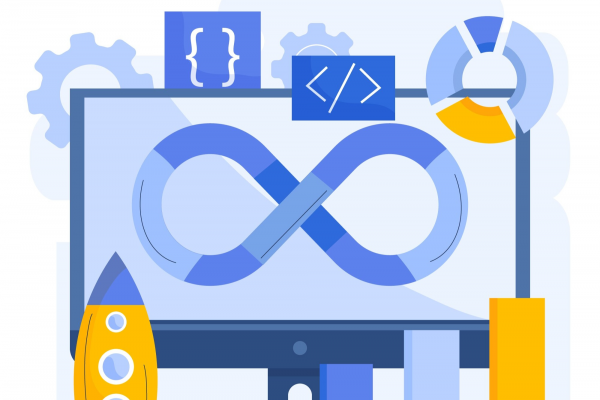In the ever-evolving business landscape, enterprise applications have become essential tools for achieving operational efficiency, enhancing decision-making, and maximizing return on investment (ROI). Enterprise software solutions enable businesses to streamline processes, improve resource utilization, and facilitate data-driven strategies that drive competitive advantage. According to Statista, the global Enterprise Software market is projected to grow by 6.35% from 2024 to 2029, reaching a market value of $400.40 billion by 2029. This upward trajectory underscores the importance of enterprise applications as organizations prioritize digital transformation and enhanced productivity.
The Role of Enterprise Applications in ROI Maximization
Enterprise applications integrate and automate diverse business functions, ranging from financial management and customer service to supply chain and human resources. By centralizing data and providing real-time access to essential information, these applications empower businesses to make informed, data-driven decisions, identify potential savings, and enhance customer satisfaction. This efficient, cohesive approach directly contributes to ROI, as enterprises can reduce inefficiencies, allocate resources more effectively, and scale without adding excessive overhead costs.
Enterprise applications also bring a transformative impact by enabling automation in repetitive tasks, allowing teams to focus on high-value activities. This shift from manual processes not only reduces the likelihood of errors but also lowers operational costs. The streamlined workflows and improved accuracy contribute to improved profit margins and greater customer satisfaction—core components of ROI maximization.
Driving ROI with Data-Driven Decision Making
The real-time analytics capabilities of enterprise applications offer organizations a powerful advantage. By providing actionable insights through data analytics, enterprise software helps businesses assess their current processes, forecast demand, optimize inventory, and streamline resource allocation. Data-driven decision-making has been shown to significantly increase ROI, as it leads to more accurate planning, faster response to market trends, and enhanced productivity. For example, analyzing inventory data in real-time allows businesses to fine-tune demand forecasting and inventory management, minimizing wastage and ensuring that customer demands are met without overstocking.
Furthermore, data analytics within enterprise applications uncover underperforming areas in business operations, enabling corrective actions to be implemented before inefficiencies escalate. By utilizing data-driven insights, organizations are better equipped to implement continuous improvements, sustaining a cycle of growth and profitability that directly enhances ROI.
Examples of ROI-Enhancing Features in Enterprise Applications:
- Automated Financial Reporting: This feature significantly reduces time and labor costs associated with manual reporting, allowing financial teams to focus on analysis rather than data entry.
- Predictive Analytics in Inventory Management: By anticipating stock requirements, enterprise applications help minimize overstock and shortages, ensuring a more efficient supply chain.
- Integrated Customer Relationship Management (CRM): Enhanced customer engagement is a primary driver of revenue, as CRM tools increase retention rates and encourage repeat purchases.
Implementing these features can bring measurable improvements in ROI, translating to reduced operational costs, increased revenue, and streamlined business models that support long-term growth.
Choosing the Right Enterprise Application for Your Business
Selecting the right enterprise application is vital to achieving its ROI potential. Given the diverse landscape of enterprise solutions, organizations must carefully evaluate their current and future needs, the flexibility of their infrastructure, and long-term growth objectives. Enterprise applications range from comprehensive ERP systems that address multiple business areas to specialized solutions for functions like customer management or supply chain optimization.
Due to the investment required in implementing an enterprise application, thorough assessment is essential. Decision-makers should prioritize applications that are scalable, customizable, and easily integrated with existing systems, ensuring that they remain adaptable to future technological advancements and evolving business needs.
Key Considerations for Selecting an Enterprise Application:
- Scalability: The application should grow with your business, accommodating new processes and increased data loads.
- Integration: Solutions that seamlessly integrate with your current systems can prevent costly disruptions.
- Customization: Flexible applications allow for customization that aligns with unique business processes and user needs.
Partnering with trusted experts like STL Digital can help businesses effectively implement and leverage enterprise applications to maximize ROI. STL Digital offers customized enterprise transformation services that align with business goals, ensuring clients can fully capitalize on their digital investments and realize measurable returns.
Unlocking the Future of Business Operations with Enterprise Applications
The future of enterprise applications lies in their ability to adapt and evolve alongside emerging technologies such as artificial intelligence (AI), machine learning, and predictive analytics. AI-driven features within enterprise applications are transforming business functions by automating complex tasks, offering predictive insights, and ensuring operational continuity.
Emerging advancements in edge computing, for example, bring data processing closer to the source, reducing latency and allowing for real-time decisions on the factory floor or customer service applications. Meanwhile, integration with IoT sensors in supply chains or manufacturing settings provides instant, actionable data, enabling businesses to optimize logistics, maintenance, and service delivery. As these technologies are increasingly integrated into enterprise applications, companies can expect even greater enhancements in efficiency and ROI.
Future Developments in Enterprise Applications:
- AI-Driven Autonomy: Automated maintenance and process optimization will enable proactive management of operations, reducing downtime and ensuring optimal performance.
- Enhanced Predictive Capabilities: Advanced analytics will predict customer trends, product demand, and potential operational risks, helping organizations to act swiftly and maintain high service levels.
- Real-Time IoT Integration: Real-time insights from connected devices will further enrich enterprise applications, offering granular control over processes and a more accurate view of operations.
As the enterprise application market continues to expand, the adoption of advanced technologies will shape the future of business operations. For companies that leverage these tools for data-driven decision-making and operational optimization, the potential for sustainable growth is immense. Partnering with industry leaders like STL Digital enables businesses to stay ahead in a competitive environment, ensuring they not only maximize ROI but also secure a stronghold in their respective markets.
With the right enterprise applications, businesses can transform their operations, achieve lasting value from their technology investments, and confidently navigate the path to success in a dynamic, digitally-driven world.



